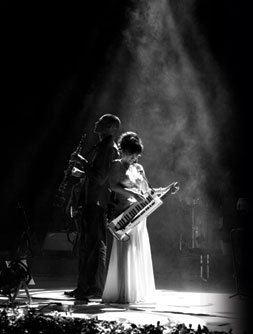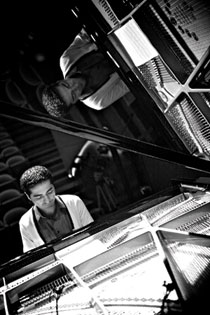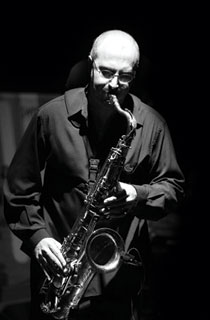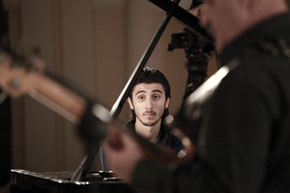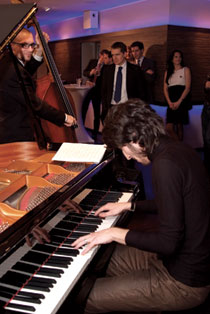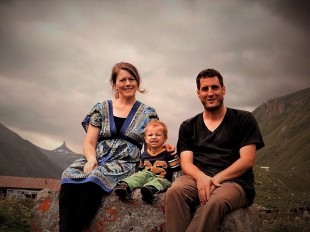Pages 78-82
by Ian Peart and Saadat Ibrahimova
The second half of October dangled another tantalising musical menu before Baku’s jazz aficionados; with more than twenty concerts scheduled for those two weeks, there were some agonising choices to be made – where to allocate those precious manats? With a mixture of local (eg. Salman Gambarov) and international (Dianne Reeves), upcoming (Elchin Shirinov) and established (Monty Alexander), it was not easy. This correspondent stretched the wallet to five concerts and got agonisingly close to a regretfully missed sixth. The international big stars naturally cost more, so we went for a wide, lower range spread, with one unfortunate exception – still, you live and learn.
Locals first
Our first ticket took us to stalwart Azerbaijani saxophonist Rain Sultanov with his ‘Magnolia’ programme, which had been developing in regular performances at the Jazz Centre, so it was familiar to seasoned followers. Rain is well known for his thoughtful and reflective compositions, which venture into musical terrain beyond jazz and beyond Azerbaijan, even though his work has always had a local base and he has also contributed much by producing the work of other musicians like classical pianist Farhad Badalbeyli and the folk music of oud player Yasef Eyvazov.
His quartet this time included brother Ramin on drums, Ruslan Huseynov on bass and the aforementioned Elchin Shirinov on piano. The set was competent rather than spectacular, and there is a feeling that Rain is looking for further inspiration following his last project, ‘Tale of My Land’. There was, however, enough interaction between him and the sparky Shirinov to set us off in search of tickets for the pianist’s own concert three days later. This proved to be the elusive sixth, a promised press allocation did not materialise, by which time all tickets had been sold out...
Unmissable
Temporarily downed spirits were lifted by the prospect of Isfar Sarabski’s concert. To be honest this had been first on our wish list. Only just 21, this brilliant young Azerbaijani pianist won the Montreux Festival piano competition in summer 2009 and has gone from strength to strength since then. On 19 October, playing with Emil Hasanov on bass guitar and Azerbaijani jazz’s favourite Russian, Alexander Mashin, on drums, he took the Philharmonia by storm. Starting with standards, as if to establish his jazz credentials, he then plucked local heartstrings with Vagif Mustafazadeh’s ‘Zibeyde’, before going classical with Bach’s ‘Air on the G String’.
After overcoming the Philharmonia’s acoustics, which don’t like electronic sound too much (ie bass guitar, this time) the second half featured a Mustafazadeh medley. This can be a tricky thing to do in Baku, as the pioneering maestro is much revered, but Sarabski improvised with such delicacy and feeling that his performance was accepted as a genuine tribute. After a gentle, emotional classical piece (Chopin?) the trio took on Tchaikovsky’s ‘Swan Lake’, which produced an extended solo from Mashin in which he seemed to switch to a one-man version of the ‘Nutcracker’ war between mice and soldiers – his kit was a true battery and the audience revelled in this exciting drummer really letting rip. An equally rousing encore, with more judicious quotes from Mustafazadeh, ensured the standing ovation that the trio, but especially the inventive Sarabski, deserved. Isfar is currently playing with a fine mix of the thoughtful and the exuberant; it will be interesting to see how this goes in the future – and also how the balance between ‘quotes’ and his own music develops. For now, Isfar Sarabski’s concerts are unmissable and this was undoubtedly the highlight of the festival that we saw.
International arrivals
After missing out on Elchin Shirinov’s concert, we waited for the first international act. Al Di Meola had been to Baku at least once before and we were told then that we should not have missed this renowned guitarist. His band this time was two amplified acoustic guitars, an accordion, bass guitar, drums and percussion and the style was a Latin jazz fusion, with the Argentinian composer Astor Piazzola still a clear influence. The musicians were expert, the performance was slick, generally up tempo and enjoyed by a highly appreciative audience, but.... it did not get to me. Di Meola is a master of technique, as was the accordion player, not credited in the programme or on the website, but somehow the two combined to produce a very similar sound on each piece played. A comment I noted at the time was ‘athletic, expert, but not gripping.’ This seemed to be a run through of favourite pieces to demonstrate technical mastery; I admired the mastery, but I also wanted it to say something and Di Meola’s performance left me thinking, ‘Nice sound, but is that it?’ His routine compliments to the beautiful city he was in simply added to the impression of style over substance.
Knowing almost nothing about Keiko Matsui, a check on the internet produced a couple of interesting looking clips featuring her husband on a haunting Japanese flute, so we went for this big star, rather than for Dianne Reeves – always ready to try the unknown rather than the familiar – big mistake; we heard later, too late, that Ms Reeves was great. The Matsui Japanese flute had been replaced by a saxophonist – Michael Ghegan – who only needed the hair to be Kenny G. The sounds produced by both are perfect for immobilising people so they hang around a little longer and fill their supermarket trolleys a little higher. If however, you have paid a fair amount of money in the expectation of jazz, then they tend to produce ground teeth. The combination of this so-called ‘smooth jazz’ and Keiko Matsui’s ‘New Age’ sentiments (‘like the oceans, music connects us all’) was a little like stirring syrup into honey.
The packed audience was noticeably younger than at other concerts and was ecstatic, nodding along sweetly to the rhythm overpinned by a drummer who certainly knew his way round the percussion block and bass drum – the unrelenting ‘boom, chock, boom, chock’ the musical incarnation of a tap dripping through a sleepless night. Matsui herself occasionally interrupted this mellifluence with a few notes on piano or keyboard that hinted at a jazz-style solo, but her nerve invariably failed as the sax flooded back to wash away any such pretence, building up the volume and the familiar thudding, body-bobbing rhythm to ensure the audience was on its feet at the end.
Old masters
We entered the Russian Drama Theatre the following evening full of apprehension: Mike Mainieri’s L’Image, another group of renowned but aging jazzmen – we have had a lot of them over recent years, some showing their age. It took about three chords to reassure us that here were musicians who were both expert and in love with their instruments. They loved them so much that they allowed them to speak for themselves, without the need for exclamation marks, bold, underlining or any other marks of stress. They even had the confidence to allow silence to speak. After the previous evening’s percussive monotony, this was most marked by the drumming of Steve Gadd – I cannot for now think of a better drummer I’ve seen. His rhythm work drove the music with a feather’s touch and, in one number, called ‘Gadd Ddagit’, he produced a wonderfully controlled, rolling solo. He coaxed his drums, treating them like old friends, into releasing all the subtleties of their sounds and his meaning – really a revelation of what can be drawn from percussion. Tony Levin did something similar on his solo on electric double bass. While David Spinozza, provided bite with his rock-style guitar – again skilfully complementary and without the histrionics normally associated with the instrument; he just let it do what it can do.
This was a group who did not feel they had to prove anything; they were totally confident in themselves and each other and simply wanted to share their pleasure in making music. Although nominally the frontman, Mainieri was as laid back and cool as the instrument he plays. It was a little unexpected when his vibraphone featured on a down home to the roots, 12-bar blues, and the band gave it their all – a real treat. They followed this with a number which began like a piece of contemporary music; the patter of dissonant parts gradually assembling into coherence. Getting on they may be, but L’Image still have the taste for experiment. The evening they provided was pure joy.
So, another Jazz Festival ends; as ever there were hot debates about what is, and what is not, jazz. This all adds to the spice of the event – wouldn’t it be boring if we all had the same tastes? There were, however, one or two acts, not mentioned here, who are surely best remembered for what they did, not for what they are doing and my main pleas would be for more recognition of youth and more honour to the prophets in their own country – but, in any event, keep the music playing!
.... and the band played on
Following Isfar Sarabsky’s appearance at the Jazz Festival, The European Azerbaijan Society (TEAS) arranged for German audiences to hear his astonishing performance. Firstly, he played at The Karlsson, high above the streets of Berlin. The 120 guests included Hans- Olaf Henkel, Former President, BDI (German Federation of Industries), Philipp Missfelder, Foreign Policy Spokesman, CDU/CSU and Chairman, Junge Union Deutschlands, together with many members of the Bundestag, diplomats, business and media representatives.
The concert was introduced by Shahin Namati-Nasab, Director, TEAS Germany, who explained the organisation’s cultural, business and political objectives.
Isfar, with Alexander Mashin on drums and Makar Novikov on double bass, performed an eclectic repertoire, including his own arrangements of Caravan by Juan Tizol (made famous by the Duke Ellington Orchestra); March by Vagif Mustafazadeh, the innovator of Azerbaijani jazz-mugham; and an arrangement of themes from Tchaikovsky’s Swan Lake Ballet. The enthusiastic audience was thrilled by the virtuosity and sensitivity of the young pianist. The event was presented by Jazz Radio and was followed, on 3 December, by a larger concert at the Opernpalais for Berlin’s network of jazz aficionados.
H.E. Parviz Shahbazov, Azerbaijan’s ambassador to Germany, spoke at the latter event about the successes of the inaugural Azerbaijani Science and Culture Week in Berlin and its importance in achieving pan-European recognition for the country. Sabina Rakcheyeva, TEAS Advisory Board (Arts & Culture) then explained TEAS’ dedication to promoting all aspects of Azerbaijani culture. As at The Karlsson, the Sarabsky trio enthralled the audience; their skilful and emotional interpretations resulted in a standing ovation and proved to all present that the spirit of jazz remains alive in Azerbaijan.
Back home
Commenting, on his return to Baku, Isfar was pleased with the concerts and with the reception given to the trio: ‘They were good audiences.... of course they know the standards; I have my own way to play classical jazz and they liked it. They are getting to know Vagif (Mustafazade) and they were asking questions about him and about where they can hear his music.’
Asked about the difference in playing the festival and the Berlin concerts, he was quite frank:
‘The festival was almost spontaneous; I only had one month’s notice and 3 or 4 days to rehearse as a trio. I enjoyed it, I feel more relaxed here, because I don’t have to ‘show’ myself.... in other countries I want to represent my country well and so I am not so relaxed.’
As for future plans, and why he has not yet released an album: ‘I don’t want to make a disc just to say I have got one. I want to choose good compositions that ordinary people will like as well. I want to make people think about our culture and research it – I want to highlight our music.... In the New Year there will be a tour in the USA. We will negotiate on making a disc there. I have also been invited to play in a festival and give master classes in France early next summer. Of course there may be some spontaneous concerts in Baku.’
Exact dates were not fixed as we went to press, but a concert by Isfar Sarabsky is not to be missed and ‘Visions’ recommends that you keep a look out for the name.
by Ian Peart and Saadat Ibrahimova
The second half of October dangled another tantalising musical menu before Baku’s jazz aficionados; with more than twenty concerts scheduled for those two weeks, there were some agonising choices to be made – where to allocate those precious manats? With a mixture of local (eg. Salman Gambarov) and international (Dianne Reeves), upcoming (Elchin Shirinov) and established (Monty Alexander), it was not easy. This correspondent stretched the wallet to five concerts and got agonisingly close to a regretfully missed sixth. The international big stars naturally cost more, so we went for a wide, lower range spread, with one unfortunate exception – still, you live and learn.
Locals first
Our first ticket took us to stalwart Azerbaijani saxophonist Rain Sultanov with his ‘Magnolia’ programme, which had been developing in regular performances at the Jazz Centre, so it was familiar to seasoned followers. Rain is well known for his thoughtful and reflective compositions, which venture into musical terrain beyond jazz and beyond Azerbaijan, even though his work has always had a local base and he has also contributed much by producing the work of other musicians like classical pianist Farhad Badalbeyli and the folk music of oud player Yasef Eyvazov.
His quartet this time included brother Ramin on drums, Ruslan Huseynov on bass and the aforementioned Elchin Shirinov on piano. The set was competent rather than spectacular, and there is a feeling that Rain is looking for further inspiration following his last project, ‘Tale of My Land’. There was, however, enough interaction between him and the sparky Shirinov to set us off in search of tickets for the pianist’s own concert three days later. This proved to be the elusive sixth, a promised press allocation did not materialise, by which time all tickets had been sold out...
Unmissable
Temporarily downed spirits were lifted by the prospect of Isfar Sarabski’s concert. To be honest this had been first on our wish list. Only just 21, this brilliant young Azerbaijani pianist won the Montreux Festival piano competition in summer 2009 and has gone from strength to strength since then. On 19 October, playing with Emil Hasanov on bass guitar and Azerbaijani jazz’s favourite Russian, Alexander Mashin, on drums, he took the Philharmonia by storm. Starting with standards, as if to establish his jazz credentials, he then plucked local heartstrings with Vagif Mustafazadeh’s ‘Zibeyde’, before going classical with Bach’s ‘Air on the G String’.
After overcoming the Philharmonia’s acoustics, which don’t like electronic sound too much (ie bass guitar, this time) the second half featured a Mustafazadeh medley. This can be a tricky thing to do in Baku, as the pioneering maestro is much revered, but Sarabski improvised with such delicacy and feeling that his performance was accepted as a genuine tribute. After a gentle, emotional classical piece (Chopin?) the trio took on Tchaikovsky’s ‘Swan Lake’, which produced an extended solo from Mashin in which he seemed to switch to a one-man version of the ‘Nutcracker’ war between mice and soldiers – his kit was a true battery and the audience revelled in this exciting drummer really letting rip. An equally rousing encore, with more judicious quotes from Mustafazadeh, ensured the standing ovation that the trio, but especially the inventive Sarabski, deserved. Isfar is currently playing with a fine mix of the thoughtful and the exuberant; it will be interesting to see how this goes in the future – and also how the balance between ‘quotes’ and his own music develops. For now, Isfar Sarabski’s concerts are unmissable and this was undoubtedly the highlight of the festival that we saw.
International arrivals
After missing out on Elchin Shirinov’s concert, we waited for the first international act. Al Di Meola had been to Baku at least once before and we were told then that we should not have missed this renowned guitarist. His band this time was two amplified acoustic guitars, an accordion, bass guitar, drums and percussion and the style was a Latin jazz fusion, with the Argentinian composer Astor Piazzola still a clear influence. The musicians were expert, the performance was slick, generally up tempo and enjoyed by a highly appreciative audience, but.... it did not get to me. Di Meola is a master of technique, as was the accordion player, not credited in the programme or on the website, but somehow the two combined to produce a very similar sound on each piece played. A comment I noted at the time was ‘athletic, expert, but not gripping.’ This seemed to be a run through of favourite pieces to demonstrate technical mastery; I admired the mastery, but I also wanted it to say something and Di Meola’s performance left me thinking, ‘Nice sound, but is that it?’ His routine compliments to the beautiful city he was in simply added to the impression of style over substance.
Knowing almost nothing about Keiko Matsui, a check on the internet produced a couple of interesting looking clips featuring her husband on a haunting Japanese flute, so we went for this big star, rather than for Dianne Reeves – always ready to try the unknown rather than the familiar – big mistake; we heard later, too late, that Ms Reeves was great. The Matsui Japanese flute had been replaced by a saxophonist – Michael Ghegan – who only needed the hair to be Kenny G. The sounds produced by both are perfect for immobilising people so they hang around a little longer and fill their supermarket trolleys a little higher. If however, you have paid a fair amount of money in the expectation of jazz, then they tend to produce ground teeth. The combination of this so-called ‘smooth jazz’ and Keiko Matsui’s ‘New Age’ sentiments (‘like the oceans, music connects us all’) was a little like stirring syrup into honey.
The packed audience was noticeably younger than at other concerts and was ecstatic, nodding along sweetly to the rhythm overpinned by a drummer who certainly knew his way round the percussion block and bass drum – the unrelenting ‘boom, chock, boom, chock’ the musical incarnation of a tap dripping through a sleepless night. Matsui herself occasionally interrupted this mellifluence with a few notes on piano or keyboard that hinted at a jazz-style solo, but her nerve invariably failed as the sax flooded back to wash away any such pretence, building up the volume and the familiar thudding, body-bobbing rhythm to ensure the audience was on its feet at the end.
Old masters
We entered the Russian Drama Theatre the following evening full of apprehension: Mike Mainieri’s L’Image, another group of renowned but aging jazzmen – we have had a lot of them over recent years, some showing their age. It took about three chords to reassure us that here were musicians who were both expert and in love with their instruments. They loved them so much that they allowed them to speak for themselves, without the need for exclamation marks, bold, underlining or any other marks of stress. They even had the confidence to allow silence to speak. After the previous evening’s percussive monotony, this was most marked by the drumming of Steve Gadd – I cannot for now think of a better drummer I’ve seen. His rhythm work drove the music with a feather’s touch and, in one number, called ‘Gadd Ddagit’, he produced a wonderfully controlled, rolling solo. He coaxed his drums, treating them like old friends, into releasing all the subtleties of their sounds and his meaning – really a revelation of what can be drawn from percussion. Tony Levin did something similar on his solo on electric double bass. While David Spinozza, provided bite with his rock-style guitar – again skilfully complementary and without the histrionics normally associated with the instrument; he just let it do what it can do.
This was a group who did not feel they had to prove anything; they were totally confident in themselves and each other and simply wanted to share their pleasure in making music. Although nominally the frontman, Mainieri was as laid back and cool as the instrument he plays. It was a little unexpected when his vibraphone featured on a down home to the roots, 12-bar blues, and the band gave it their all – a real treat. They followed this with a number which began like a piece of contemporary music; the patter of dissonant parts gradually assembling into coherence. Getting on they may be, but L’Image still have the taste for experiment. The evening they provided was pure joy.
So, another Jazz Festival ends; as ever there were hot debates about what is, and what is not, jazz. This all adds to the spice of the event – wouldn’t it be boring if we all had the same tastes? There were, however, one or two acts, not mentioned here, who are surely best remembered for what they did, not for what they are doing and my main pleas would be for more recognition of youth and more honour to the prophets in their own country – but, in any event, keep the music playing!
.... and the band played on
Following Isfar Sarabsky’s appearance at the Jazz Festival, The European Azerbaijan Society (TEAS) arranged for German audiences to hear his astonishing performance. Firstly, he played at The Karlsson, high above the streets of Berlin. The 120 guests included Hans- Olaf Henkel, Former President, BDI (German Federation of Industries), Philipp Missfelder, Foreign Policy Spokesman, CDU/CSU and Chairman, Junge Union Deutschlands, together with many members of the Bundestag, diplomats, business and media representatives.
The concert was introduced by Shahin Namati-Nasab, Director, TEAS Germany, who explained the organisation’s cultural, business and political objectives.
Isfar, with Alexander Mashin on drums and Makar Novikov on double bass, performed an eclectic repertoire, including his own arrangements of Caravan by Juan Tizol (made famous by the Duke Ellington Orchestra); March by Vagif Mustafazadeh, the innovator of Azerbaijani jazz-mugham; and an arrangement of themes from Tchaikovsky’s Swan Lake Ballet. The enthusiastic audience was thrilled by the virtuosity and sensitivity of the young pianist. The event was presented by Jazz Radio and was followed, on 3 December, by a larger concert at the Opernpalais for Berlin’s network of jazz aficionados.
H.E. Parviz Shahbazov, Azerbaijan’s ambassador to Germany, spoke at the latter event about the successes of the inaugural Azerbaijani Science and Culture Week in Berlin and its importance in achieving pan-European recognition for the country. Sabina Rakcheyeva, TEAS Advisory Board (Arts & Culture) then explained TEAS’ dedication to promoting all aspects of Azerbaijani culture. As at The Karlsson, the Sarabsky trio enthralled the audience; their skilful and emotional interpretations resulted in a standing ovation and proved to all present that the spirit of jazz remains alive in Azerbaijan.
Back home
Commenting, on his return to Baku, Isfar was pleased with the concerts and with the reception given to the trio: ‘They were good audiences.... of course they know the standards; I have my own way to play classical jazz and they liked it. They are getting to know Vagif (Mustafazade) and they were asking questions about him and about where they can hear his music.’
Asked about the difference in playing the festival and the Berlin concerts, he was quite frank:
‘The festival was almost spontaneous; I only had one month’s notice and 3 or 4 days to rehearse as a trio. I enjoyed it, I feel more relaxed here, because I don’t have to ‘show’ myself.... in other countries I want to represent my country well and so I am not so relaxed.’
As for future plans, and why he has not yet released an album: ‘I don’t want to make a disc just to say I have got one. I want to choose good compositions that ordinary people will like as well. I want to make people think about our culture and research it – I want to highlight our music.... In the New Year there will be a tour in the USA. We will negotiate on making a disc there. I have also been invited to play in a festival and give master classes in France early next summer. Of course there may be some spontaneous concerts in Baku.’
Exact dates were not fixed as we went to press, but a concert by Isfar Sarabsky is not to be missed and ‘Visions’ recommends that you keep a look out for the name.
